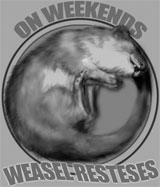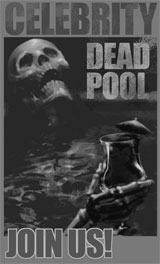Engineers are from Mars, Scientists are from Venus
I want to be very, very careful when I talk about work. I need my job. I really like the firm I work for — if we had a company song, I’d sing it. Without irony or sarcasm or anything. But it’s a stuffy old corporation; I’m pretty sure that ethics agreement I sign every year means they’d rather not be associated with someone who dresses up like a weasel and says “fuck” a lot. So, you know, discretion.
Broadly speaking, my employer is a Research and Engineering firm. Working there has given me an increased respect for engineers and a somewhat diminished respect for scientists. Engineers are what I always thought scientists were supposed to be: dealers in the empirical.
Science, it turns out, is a shockingly consensus activity. Less about mining those precious nuggets of truth, more about getting the other kids to notice you. I sometimes prepare models and illustrations to support scientific papers. We joke that an illustration goes through seven rounds of revisions as it moves down the hallway, and the last reviewer changes everything back to where it was in the first place. (Oh, how we laugh!)
Peer review = peer pressure. If you liked Junior High, you’ll love science.
Here’s how an engineer goes about it. He takes an aluminum rod and attaches weights to the center until the rod bends. He makes note of the weight. He does this five times, takes the average, and calls that The Weight At Which An Aluminum Rod Will Bend.
Here’s how a scientist does it. He looks at the literature on The Weight At Which An Iron Rod Will Bend and predicts how the aluminum rod will bend based on a comparison of the tensile strength of the two metals. He then passes it to Bob who is obsessed with meta-studies. Bob wrote a special program that sifts through piles of published material on metallurgy (regardless of source or quality) and spits out conclusions. He passes the result to John. John secretly thinks Bob is a maroon, and is delighted to point out that Bob’s program lumped metric and imperial units together and Bob’s contribution will have to be thrown out. So it goes to a research assistant whose job it is to make the imperial to metric conversions before it goes back through Bob’s data sifter. Then it goes to Bill, who points out that the original Weight At Which An Iron Rod Will Bend study was seriously flawed and recommends using The Weight At Which A Steel Rod Will Bend study as a starting point instead. Back to square one. Finally, it goes to the head of the department, who blows his top because “the last time we went on record with a precise numerical metal-bending prediction, we got our asses sued off,” and shit-cans the whole thing.
See, engineers have to make actual stuff. If an engineer makes a duff calculation, the bridge falls down and lots of people die. He might even get fired. When a scientist turns out to be wrong, it’s all part of the rich interplay of ideas that is woven into the very fabric of scientific investigation and shit. No scientist ever got famous dreaming up boring theories, so the temptation is to pull something big and interesting out of your ass and throw it against the wall. The career consequences of being wrong are minor.
I’m generalizing grossly, of course. And if I can generalize more grossly still, judging from snippets of conversation I hear walking through the company cafeteria, engineers lean rightward politically, scientists leftward.
I think of this whenever I read that “scientists say” something. Particularly when that something is big and interesting and looks like it was pulled out of an ass.
Get back to me when engineers start saying it.
Posted: March 5th, 2007 under engineering, personal, science, work.
Comments: 2
Comments
Comment from whig
Time: March 6, 2007, 12:50 pm
There seems to be a difference between some people who call themselves scientists and those who observe and follow the scientific method.
But that can be true for probably any school or method.
Pingback from S. Weasel
Time: March 9, 2007, 8:20 am
[…] Okay, now I feel bad for dissing scientists. The ones I’ve known all share at least one excellent characteristic: they’re natural born explainers. No scientist would dream of letting me draw something until he was sure I had a basic grasp of the science. […]











Write a comment
Beware: more than one link in a comment is apt to earn you a trip to the spam filter, where you will remain -- cold, frightened and alone -- until I remember to clean the trap. But, hey, without Akismet, we'd be up to our asses in...well, ass porn, mostly.<< carry me back to ol' virginny